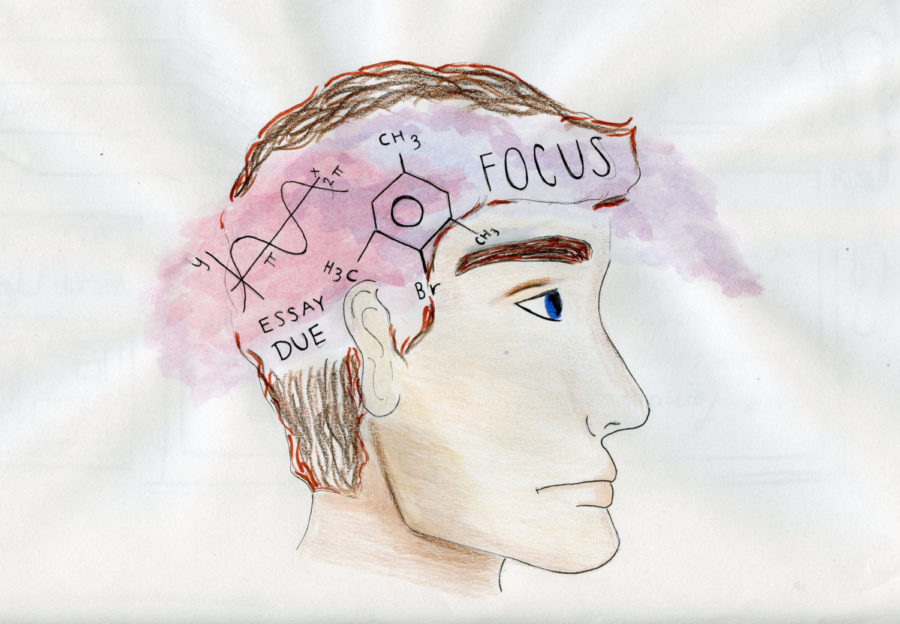ADHD, ADD present complex challenges for several students
December 22, 2017
In the middle of a math lesson, junior Delaney Ehrhardt finds herself zoning out. The next time she looks at the board. A whole new page of notes has been taught and she rushes to finish before the bell rings. This is a moment all too familiar to Ehrhardt, who suffers from attention-deficit/hyperactivity disorder (ADHD). According to an unscientific Oracle survey of 301 students, 12 percent said they suffer from ADHD or attention-deficit disorder (ADD), while 27 percent know one or more people who have been affected by it.
According to Alan Esser, GBS Social Worker, students who suffer from ADHD will struggle with executive functioning skills, which include organization and managing time, mixed with hyperactivity, which causes disruptive behavior, especially with younger children. Symptoms usually present themselves in late elementary or early middle school, but can appear earlier or later, says Esser.
“There is a huge difference between having trouble focusing every once in a while, or in a certain class versus kids with ADHD who are struggling to focus in every class and at home,” Esser said. “Early on, especially with boys, [students diagnosed with ADHD] can be hyperactive. A lot of time it will be students who have some behavior concerns in class too, [such as] talking out of turn.”
Ehrhardt was diagnosed with ADHD in second grade when her teacher and parents noticed that she struggled to progress past a level two math test, even after half of her classmates had moved on to the next level.
“I was super frustrated so I [fell] into self-doubt and insecurities,” Ehrhardt said. “[My parents] brought me to get tested in this cold room in Evanston, [where a neuropsychologist] gave me memorization cards and read me words that I would have to repeat five minutes later. I guess they are easy for other people, but for me, I kept messing up and I couldn’t get it straight.”
According to Esser, there are many ways people can cope with ADHD, some of which include medication. Ehrhardt says she tried using Adderall, a drug perscribed to treat ADHD by improving focus as well as helping the brain control hyperactivity, to help her concentrate and be more productive before her first semester finals in freshman year. Ehrhardt says she found that it didn’t work as well as she had hoped and she was forced to try other methods in order for her to be productive with her time.
“Some of the side effects of the medication were no sleeping and no eating, which turned me away,” Ehrhardt said. “I think it’s a personal preference. I’ve learned to cope with it [instead] and I use fidget toys and chunk out my time, all of which helps me be more proactive.”
Similar to Ehrhardt, sophomore Katrina Donatello has learned to manage her ADHD over time. According to Donatello, she was diagnosed in 8th grade and has found that her time management has improved over the years.
“Sometimes, after I realize that I haven’t been focusing or I don’t have the grades I want, I realize that I have to make a plan and figure out what to do,” Donatello said. “I’ll talk with my teachers about it and they’ll give me a spot in the room where I can do my work, or I’ll get extra time so that I can focus.”
Although she has noticed her time management and organizational skills improving, Donatello still finds herself spacing out and losing focus at different times.
“During an Orchesis rehearsal, we were in the middle of learning a dance [when I zoned out],” Donatello said. “My choreographer was busy trying to get my attention, but I was staring off into space and I didn’t hear her. She had to clap her hands in front of my face so that I could focus.”
Both Donatello and Ehrhardt believe that there is a negative connotation surrounding ADHD and ADD. Donatello says having ADHD is normal and she hasn’t let what people say affect her.
“I feel like people think that since you have ADHD, you’re not smart enough or you don’t do well in school,” Donatello said. “That’s definitely not the case because I know a ton of people who have it and are really smart and doing well. There shouldn’t be a bad connotation with it because it is normal.”
According to Esser, there are many resources at South for students with ADHD or ADD to use. Esser says that social workers help students come up with organization plans and can encourage parents to decrease their reliance on doctors visits for a condition relatively common among students.
“While it’s not fun to ask for help, a lot of kids deal with [ADHD or ADD], much more than people think,” Esser said. “A lot of kids think that if they need help for ADHD, it involves going to the doctor and taking medication. Sometimes they don’t want to be labeled. [There are] always ways to help students without having to do all of that.”



